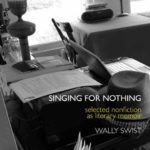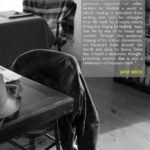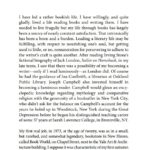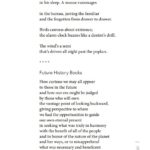
Humans
- Wally Swist (author)
- Elæ Moss (artist)
ISBN
978-1-946031-31-0
LCCN
2018948542
Page count
370
Keywords
Poetry, Prose, Essay, Essays, Nonfiction, Creative Nonfiction, Non-Fiction, Memoir, Biography, Review, Reviews, Commentary, Literature, Culture, Spirituality, Compilation, Selections
Publication date
2018
Language(s)
English
Publication media type
Print Document
Publication series
Unlimited Editions
Singing For Nothing: Selected Nonfiction As Literary Memoir
“It turns out Wally Swist is a skilled essayist and reviewer as well as a celebrated poet and a decidedly eclectic reader. Singing for Nothing (the title alone says something about the condition of poetry) is a refined review of the work of both known and overlooked contemporary poets, as well as essays and reviews of the work of a range of artists, writers, and even scientists. The accounts are so intriguing, even for those unfamiliar with the subterranean world of poetry or obscure literature, after reading this book one would want to head off to the nearest library or bookstore and see what you’ve missed.” — John Hanson Mitchell
“Wally Swist’s life has been steeped in poetry and guided by a steadfast belief in the power of literature. As book seller, a book creator, a poet, an essayist, a reviewer, and a generous supporter of other writers, he inhabits a world in which reading is indivisible from writing, and can’t be untangled from life itself. So, it seems utterly fitting that Singing for Nothing maps that life by way of his essays and reviews. Through the assiduous shaping of his critical commentary on literature from around world and close to home, Swist has created a distinctive, thought-provoking memoir that is also a celebration of literature itself.” — Jane Brox
Singing for Nothing was written over a period of 40 years. The essays, reviews, and other selected prose collected here constitute the author’s poetic ruminations, his political and social thought, and his perennial philosophy over that time — to now. Much of the book was composed only recently in an attempt to push the traditional boundaries of nonfiction and memoir. Each of the eight chapters are introduced with anecdotal material from Swist’s literary life, which albeit was impoverished financially, at times, but nearly always rich with his meetings with authors and his luminous reading through the years.
Topics include reviews of the work of significant poets and writers; a chapter regarding haiku, an often misunderstood Japanese poetic form, and its intersection with Zen; a few academic essays regarding pop culture, the science of measurement, and the history of retirement in America; several blogs regarding psycho-spirituality; and a guided morning meditation using the chakras closes this book, which also includes some of this award-winning poet’s poetry. The volume’s subtitle, “Selected Nonfiction as Literary Memoir,” is apropos for what this book both embraces and what it explores by pressing the limits of traditional literary boundaries.
About the Contributor(s)
Wally Swist is the author of some three dozen books and chapbooks of poetry and prose. Among his books are The Daodejing: A New Interpretation, with co-authors David Breeden and Steven Schroeder (Beaumont, TX: Lamar University Press, 2015). His book Huang Po and the Dimensions of Love was selected co-winner of the 2011 Crab Orchard Series Open Poetry Contest, Pulitzer Prize-winning poet Yusef Komunyakaa served as judge, and the book was published by Southern Illinois University Press in 2012. The book was nominated by Southern Illinois University Press for a National Book Award. Swist has also published three previous books of poetry with Shanti Arts, of Brusnwick, Maine: Candling the Eggs (2016); The Map of Eternity (2018); and The Bees of the Invisible (2019). His books of nonfiction include Singing for Nothing: Selected Nonfiction as Literary Memoir (Brooklyn, NY: The Operating System, 2018) and On Beauty: Essays, Reviews, Fiction, and Plays (New York & Lisbon: Adelaide Books, 2018). Swist is a recipient of Artist's Fellowships in poetry from the Connecticut Commission on the Arts (1977 and 2003). He was also awarded a one-year writing residency (1998) and two back-to-back one-year writing residencies (2003-2005) at his former mentor's home, Fort Juniper, the Robert Francis Homestead, in the Cushman Village section of Amherst, Massachusetts. Swist's work has appeared in such national periodicals such as Commonweal, The North American Review, Rattle, Rolling Stone, Yankee Magazine, and Your Impossible Voice. He currently makes his home in western Massachusetts, where he is semi-retired and works as a freelance editor and writer.
Elæ Moss is a multimodal artist-researcher, curator, designer, and educator. Seeking Speculative Solidarities, they employ analog and digital media to investigate human, institutional and ecological systems and to iterate open source strategies for ecological and social change. Recent projects have shown at La Mama Galleria, EFA Project Space, STWST/Ars Electronica, Usdan Gallery, Judson Church, the Segal Center, SOHO20, Dixon Place, and the Exponential Festival, among others. Select publications include Big Echo, Tagvverk, Vestiges, Matters of Feminist Practice, The Transgender Narratives Anthology, Choice Words: Writers on Abortion, The Brooklyn Poets Anthology, and Resist Much, Obey Little: Inaugural Poems to the Resistance. Books include Ground, Blood Altas, Overview Effect, Sweet and Low: Indefinite Singular, Bodies of Work, and The Precarity Bodyhacking Work-Book and Guide. Moss is a Professor at Pratt Institute, and the developer / founder of the Operating System + Liminal Lab. More at: https://onlywhatican.net and https://theoperatingsystem.org.







